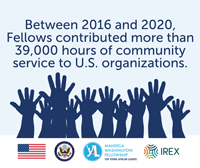 |
Mandela Washington Fellowship, a U.S. Department of State program for young African leaders, partners with the Cox International Center for virtual program. |
Launch Of Online Course On Digital Storytelling For Mandela Washington Program
In July of 2020, the Cox International Center (in collaboration with the UGA Office of Global Engagement) was awarded a competitive grant from the U.S. Department of State to develop an online training program for Mandela Washington Fellows and Alumni. The Cox International Center is an outreach unit of the Grady College of Journalism and Mass Communication.
The course is a part of a U.S. Department of State and IREX initiative to launch a new online Fellowship Portal. The Portal provides a unique opportunity to bring the Fellowship’s nearly 4,400 Alumni, selected finalists and alternate candidates for the 2021 Fellowship, Reciprocal Exchange Awardees, and selected Fellowship Partners, together to virtually explore strategies for leading in times of crisis and shifting paradigms. The Mandela Washington Fellowship for Young African Leaders is the flagship project of the U.S. Government’s Young African Leaders Initiative (YALI). Since 2014, nearly 5,100 young leaders (between the ages of 25 and 35) from every country in Sub-Saharan Africa have participated in the Fellowship.
The title of this online course developed by the Cox International Center is “Digital Storytelling: New Models to Promote Local Initiatives after a Crisis”. The program focuses on how organizations, particularly nongovernment organizations (NGOs), can use digital platforms to promote their initiatives and raise awareness with their target audiences. Content covers the power of storytelling in the digital era and how civic engagement can be fostered through social and other communication channels. The components also address the development of new communication business models at local and regional levels and introduces strategies to make community issues relevant and attractive to traditional media. The digital revolution has produced major changes in the field of mass communication. As traditional media outlets often struggle to cover local issues - due to decreases in financial and human resources - new production and distribution technologies have produced new types of communicators and have helped non-media organizations bring audio-visual products directly to the public.
The topics are discussed and analyzed in three sections:
In the first part, Grady College’s Professor Valerie Boyd and communication expert Moni Basu discuss the ways in which narrative can be used to communicate and impact change, with a particular focus on how narrative can facilitate positive change. Participants gain an understanding of the power of narrative and how to identify compelling narratives that exist within their work and organizations.
In the second section, Dr. Keith Herndon of Grady College examines the significant changes ahead for the business models supporting media. He addresses media innovation and shares three key trends poised to influence media business models in the near future: the audio explosion, exponentially faster networks, and labor-reducing technologies.
The last part, titled Voices heard-Communication lessons during and after a major crisis, consists of a panel coordinated by Dr. Tudor Vlad, director of the Cox International Center. It studies the growing role of NGOs in emerging democracies and the strategies to bring their local or regional initiatives to the attention of both traditional and new media organizations. The discussion addresses the use of social media to promote social, economic, and cultural progress. Panelists are Mr. Kenneth Foskett, Atlanta Journal Constitution journalist; Ms. Margaret Middleton, NGO representative; and Dr. Akinloye Ojo, director of the Institute of African Studies and radio host.
The completed virtual package was delivered in September of 2020.

